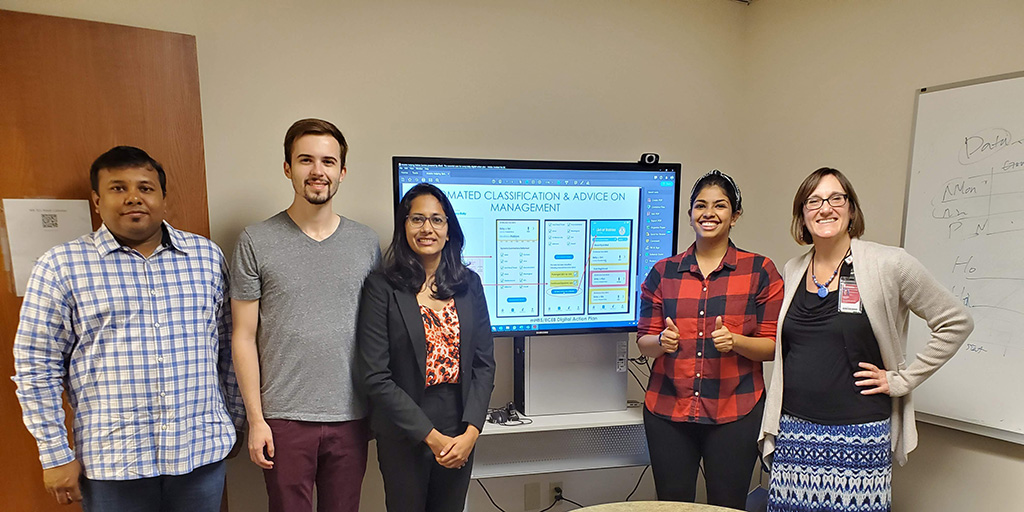
The first 24 hours after birth can determine long-term health outcomes for at-risk babies. Graduate students from the IU School of Informatics and Computing at IUPUI and the Purdue School of Science at IUPUI helped develop a tool that could help babies, new mothers, and their caregivers as far as the other side of the world—and as close to home as Indiana.
Labor and delivery at most hospitals is a busy place, and the nurses that care for the newest members of society have to be especially vigilant during the first day, making sure nothing is overlooked. Vitals must be monitored and a baby’s status needs to be updated and communicated multiple times a day. Recently, the team of Kevin Horan (Computer Science), Radhika Ravindran (Human-Centered Computing), and Anushri Singh Rajapuri (BioHealth Informatics)—pictured above with BioHealth Informatics faculty Dr. Saptarshi Purkayastha and IU School of Medicine researcher Dr. Sherri Bucher—answered a challenge from the American Medical Informatics Association (AMIA) to design a digital solution to support the decision-making of health care providers in any area of medicine.
At the 2019 AMIA Conference on November 19, Rajapuri presented the team’s app, Essential Care for Every Baby: Neonatal Clinical Decision Support Tool, which garnered the team a first place in the AMIA Design Challenge.
According to the team’s proposal, every year, globally, there are 2.5 million stillbirths and 2.7 million neonatal deaths during the first month of life. Low- and middle-income settings, particularly within sub-Saharan Africa and Southeast Asia, bear the highest burden for this newborn mortality. The great tragedy of these deaths is that most are preventable.
To address this urgent global health challenge, the American Academy of Pediatrics (AAP) and key global development partners have deployed a suite of interrelated maternal and newborn educational and training programs called Helping Mothers Survive and Helping Babies Survive. These initiatives have been specifically designed to equip health care providers in low- and middle-income countries (LMICs) with the knowledge, skills, and competencies to provide evidence-based, life saving care to mothers and babies during labor, delivery, and the first month after birth.
Essential Care for Every Baby (ECEB), part of the Helping Babies Survive series, is designed to equip health providers in LMICs with the ability to prevent, recognize, and manage common newborn complications from birth through the first 24 hours postnatal, or until discharge from a health facility after delivery. However, key challenges, barriers, and bottlenecks threaten the sustainability of this program at scale. In particular, perennial challenges in LMICs, including understaffing and extremely high nurse-to-patient ratios, deleteriously impact the ability of healthcare providers to adequately monitor, track, and provide integrated essential newborn care interventions to mother-baby pairs under their care.
Due to a lack of specialists, including physicians in these settings, nurses provide the vast bulk of care—around the time of labor, delivery, and the postnatal period—to mothers and babies. This, in turn, results in significant cognitive load for nurses, who struggle to perform varied tasks every few minutes for each baby under their care. Finally, in many settings, where newborn death is frequent and there is a feeling of “learned helplessness” in prevention of newborn mortality, healthcare providers often feel social and cultural pressure to attend to potential maternal complications more urgently. In this high-load situation, although mothers might receive some care, the ‘voiceless’ baby is sometimes ignored.
The team explained, “The digital tool we have designed is built to tackle these complex challenges. It has been purposely designed to deliberately and thoughtfully reduce cognitive load among healthcare providers who provide essential care for every newborn in overcrowded, high-pressure clinical care environments.” Built with open-source methods, the ECEB Digital Action Plan is an innovative, scalable, clinical-decision-support mobile app that incorporates key educational, training, and evidence-based methodology from the paper-based ECEB curriculum, but prioritizes recognition over recall and addresses the many barriers encountered by healthcare providers who deliver maternal-newborn care to mothers and babies on a daily basis in LMICs.
“Winning this highly reputable and competitive design challenge is a testament to the interdisciplinary spirit of my lab, school, and campus. The team included students and faculty from the departments of Human-Centered Computing, BioHealth Informatics, Computer Science, and the School of Medicine. Without this interdisciplinary collaboration, solving complex problems is nearly impossible,” Purkayastha said.
Media Contact
Joanne Lovrinic
jebehele@iu.edu